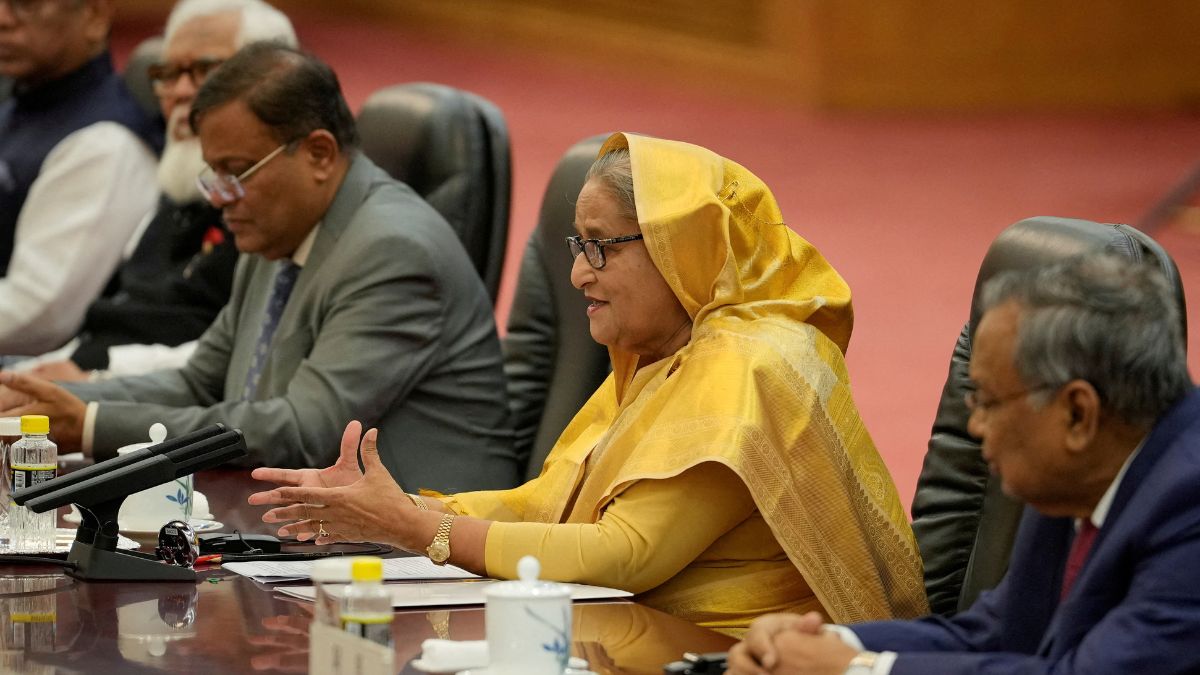Bangladesh prime minister Sheikh Hasina returned home from China earlier this week, cutting her trip short. Hasina, who was reportedly supposed to leave Beijing on Thursday (July 11) morning, departed on Wednesday night.
This was Hasina’s fifth visit to China as Bangladesh’s PM and the first in five years. However, her early return from Beijing signals she did not get what she wanted from the trip.
Let’s take a closer look.
What happened during Hasina’s trip?
Bangladesh PM Hasina met China’s president Xi Jinping and her Chinese counterpart Li Qiang in Beijing on Wednesday (July 10).
The two countries signed 21 agreements, including three renewed Memorandums of Understanding (MoUs). The visit also saw Beijing and Dhaka elevating their “strategic partnership” to a “comprehensive strategic cooperative partnership,” according to Bangladesh’s state-run news agency Bangladesh Sangbad Sangstha (BSS).
Dhaka and Beijing also announced seven more projects.
The agreements were signed in the presence of Hasina and Li after the delegation-level talks between the two countries, as per BSS.
The Bangladesh PM and her Chinese counterpart’s bilateral talks were dominated by the Rohingya issue, business, trade and commerce, investments and the countries’ ties. The two also discussed regional and international matters.
The bilateral pacts mostly covered trade and investment. They also included the construction of 6th and 9th Bangladesh-China friendship bridges, export of agricultural products from Bangladesh, infrastructure development, and people-to-people connectivity, noted PTI.
Impact Shorts
More ShortsChina will give economic grants to Bangladesh, along with interest-free loans, concessional loans and commercial loans, BSS reported citing the Chinese president.
Bangladesh foreign minister Hasan Mahmud described Hasina’s meeting with Xi as a “very successful discussion” held in a “very cordial environment.”
According to China’s official Xinhua News Agency, Wang Huning, a member of China’s Politburo Standing Committee who met with Hasina, said, “China and Bangladesh have respected and treated each other with equality, setting a good example of friendly coexistence and mutually beneficial cooperation between countries.”
Why did Hasina return early?
Hasina’s early return from China citing her daughter’s health has more to it than meets the eye.
According to Bangladesh’s foreign ministry, China will provide economic assistance of 1 billion yuan ($137 million or Rs 11,52 crore) to Dhaka. The announcement was made by Li as he met Hasina.
However, Dhaka was hoping for more.
As per an Economic Times (ET) report, Hasina may have been “upset” over the less-than-promised financial assistance and the lack of “appropriate protocol” extended to her.
Ahead of the Bangladeshi PM’s visit, China had promised $5 billion loan assistance to Dhaka but announced a package of just $100 million during Hasina’s trip.
Bangladesh’s PM had expected to hold lengthy talks with Xi but only got a brief interaction. It was Li who was her “principal interlocutor,” people aware of the matter told ET.
Moreover, Chinese foreign minister Wang Yi did not even call on Hasina during her Beijing trip. State-run Chinese media that gives ample coverage to any visiting leader did not accord the same courtesy to Bangladesh’s PM.
“These developments may have cast a shadow over the visit, influencing Hasina’s decision to return home ahead of schedule in pretext of attending to her daughter’s health”, people told ET.
Bangladesh-China ties
Dhaka’s relations with Beijing have been friendly. Driven mostly by defence and economic cooperation, China’s presence has significantly grown in Bangladesh in recent years.
China has been Bangladesh’s largest trading partner for 13 years. Chinese investments in Bangladesh touched $3.2 billion last year, making Beijing the second-largest source of foreign investment. The United States remains Dhaka’s largest source of foreign direct investment.
As per the Indian Express report, China has contributed to notable infrastructure development in Bangladesh, including seven railway projects, 12 highways, 21 bridges, and 31 power stations.
Bangladesh joined China’s ambitious Belt and Road Initiative (BRI) in 2016. Defence ties between the two countries have also expanded. China provided military fighter jets, tanks and submarines to Bangladesh in recent years.
In fact, China accounted for 74 per cent of Bangladesh’s arms imports in the 2015-2019 period.
When the US and European countries pressured Hasina’s government to hold free and fair elections in January, China openly took Hasina’s side.
Dhaka and Beijing will celebrate the golden jubilee of their diplomatic relations next year.
Bangladesh treads a tightrope
Bangladesh has historical and cultural ties to India, the rising power in Asia which has a longstanding border conflict with China.
Dhaka has tried to maintain a balanced approach towards India and China. Hasina has shown a “notable tilt towards India with two visits to New Delhi in rapid succession,” Syed Munir Khasru, chairman of the international think tank The Institute for Policy, Advocacy, and Governance (IPAG), India, wrote for Indian Express.
Hasina attended PM Modi’s third swearing-in ceremony on June 9 in Delhi. She returned to India in less than two weeks for a two-day state visit. Her trip to China this week indicates Hasina wants a partnership with both New Delhi and Beijing.
However, amid growing geopolitical tensions and as “economic interests intertwine with domestic politics”, Bangladesh’s balancing act may become increasingly difficult, as per the Indian Express article.
“While economic cooperation with China has brought development dividends, it has also raised concerns about debt dependency and strategic vulnerability. The evolving geopolitical landscape in South Asia and the Indo-Pacific region has made Bangladesh’s neutral stance increasingly difficult to maintain. The country finds itself navigating complex issues like regional security, water rights, and economic integration, with potential to strain its relationships with the two giants,” Khasru wrote in his piece for the newspaper.
With inputs from agencies


)

)
)
)
)
)
)
)
)



